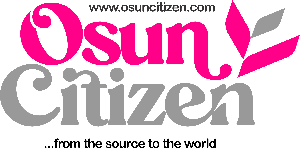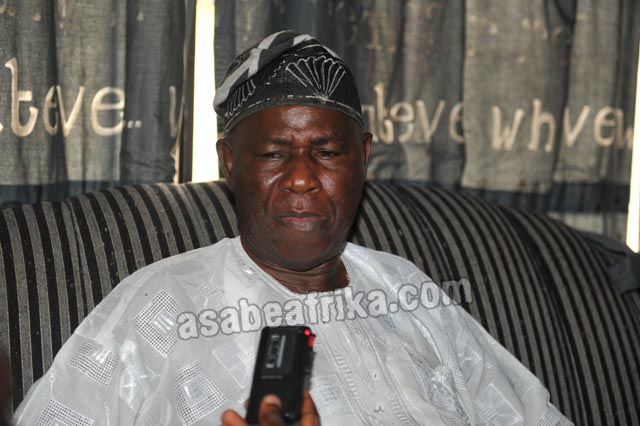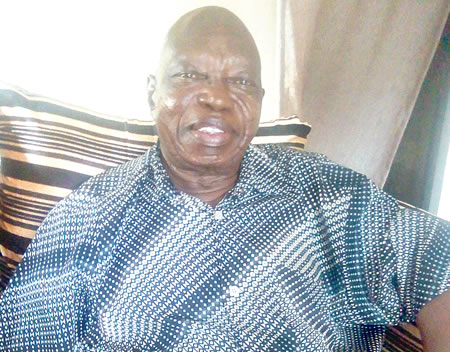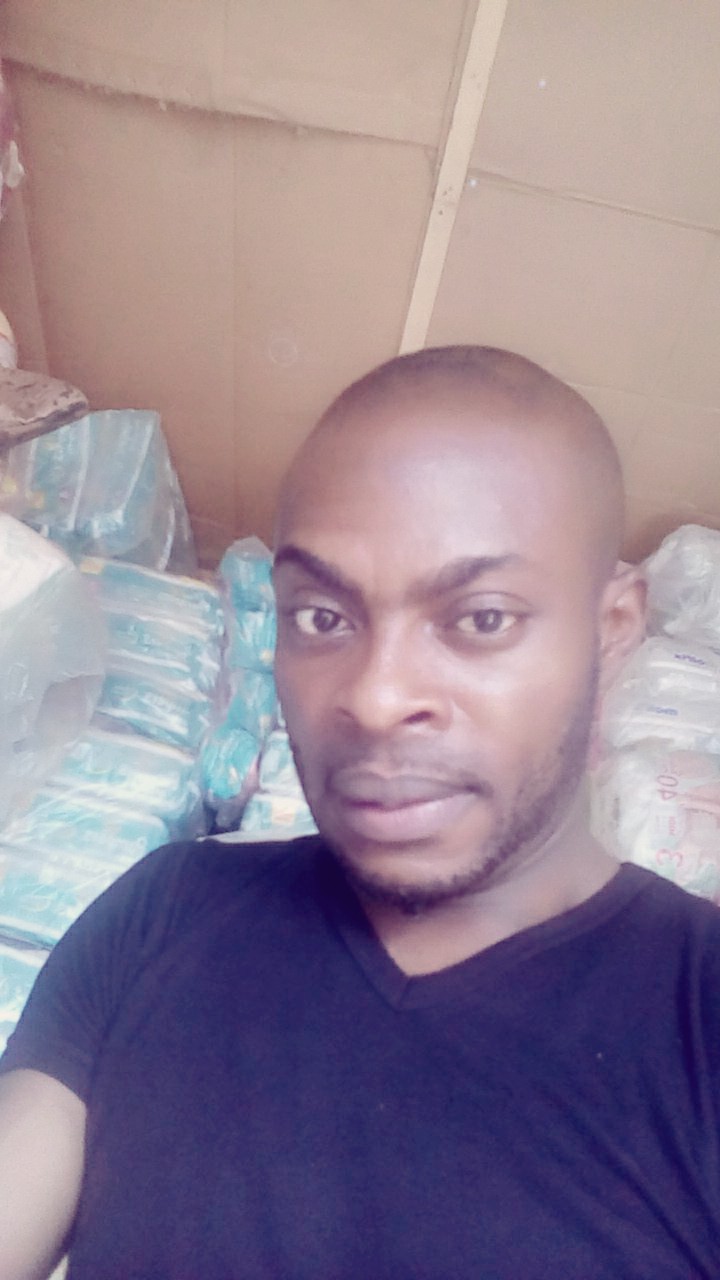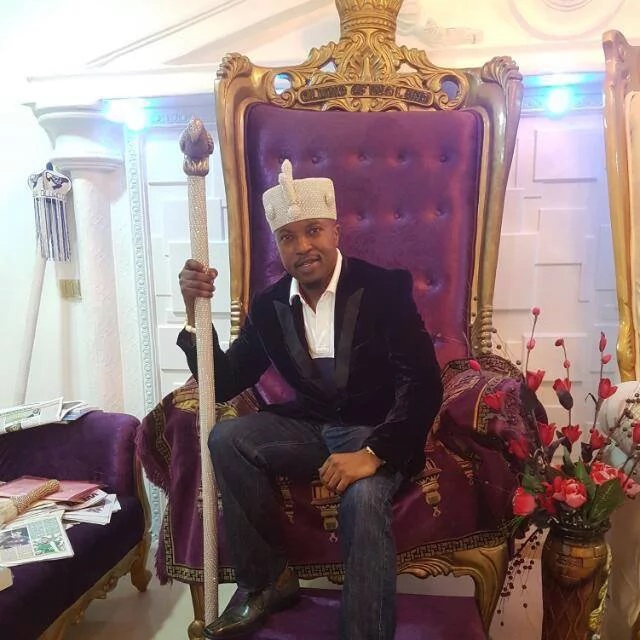I WAS BORN INSIDE A VEHICLE! Health Minister, Professor Isaac Adewole His Vision And Mission

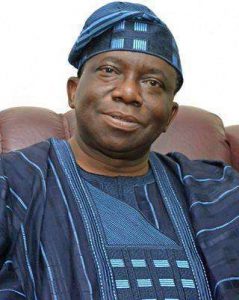
I WAS BORN INSIDE A VEHICLE!
Health Minister, Professor Isaac Adewole
His Vision And Mission
Former Vice Chancellor of the University of Ibadan, Professor Isaac Folorunso Adewole, an expert in gynaecology and obstetrics, a native of Ilesa, Osun state who hold sway as the honorouble minister of health, in this interesting interview which was conducted when he turned 60 years old, talks about his growing up, career, unionism, politics, failed marriages, women, family and other issues…
How has life been over the last 60 years?
It is a story of thanksgiving simply because I was delivered inside a vehicle. By ordinary run of events, maybe I shouldn’t be alive. That I am alive is evidence of God’s faithfulness. I was born into a happy family and I am a lucky son of lucky parents. I credit myself to have come through an extended family where I was the darling of the family. As a youth, I travelled a lot with my uncle. I attended three primary schools because I had to move with my uncle who worked with cocoa marketing board. I started from Ilesa, came to Ibadan and later went to Akure, from where I moved back to Ilesa. I was lucky to attend good primary and secondary schools with good mixture of local and international teachers. I was taught physics, chemistry and biology by Canadian, Pakistan and Indian teachers respectively. I was lucky to attend U.I. and I thank God for where I am today. To be a vice-chancellor, which is a privilege, doesn’t say that I am the best but one of the best. Now I have taken enough from my parents and country, it is the time to give back.
What led to your being born in a vehicle?
My mother, a trader, fell into labour inside her shop and a prominent medicine vendor in Ilesa that had a vehicle, Mr. Abimbola, was called. He came to her rescue and took my mother to the hospital but before they got to hospital, I was delivered inside his vehicle.
Did that influence your choice of career as a medical doctor?
To be honest, it didn’t. My being a doctor is divine. My father, though a trader, had unusual relationship with some missionary doctors and laboratory scientists. Through that relationship, I was paying regular visits to Wesley Hospital, Ilesa in Osun State. I got drawn into the serene environment. Wesley, a top rated hospital in those days, had everything well set with classic green environment, the walls white and neat. The last time I visited Wesley, I almost wept because that is not Wesley I knew in those days. Then, I interacted with them, I visited them and I used to come back to my father’s shop to recreate the hospital environment. I would act the role of a doctor. I would invite imaginary people to come and pick their medications and injections.
When my uncle saw this he said this boy would be a medical doctor. At that time, I was fascinated by flying and I wanted to do aeronautic engineering. But one way or the other, I had fantastic science teachers. The guidance counselor, Mr. Adelekan, also gave me subjects combination for medicine which are: chemistry, biology and physics. Some of my teachers took interest in me. I was made a library prefect. I became the first secretary of the Students’ Representatives’ Council, SRC, in Ilesa Grammar School, my secondary school.
A new principal was brought to my school shortly after we staged a riot. The principal then established SRC in order to bridge the gap between the students and the teachers and I was made the first secretary of SRC. That put my eyes on unionism. It fascinated my belief that for effective management, there must be no gap between the leaders and the led. I have adopted it.
Is it true, as attested by a man who knew you in secondary school, that you used to run after beautiful girls then?
I wouldn’t know whether I ran after beautiful girls. But I think the first law of magnetism is that unlike poles attract naturally.
Did you specialise in the women aspect of medicine because you love women?
I respect women, I respect women, I respect women. I live by them, they gave me a living.
Are your friends in Ilesa Grammar School correct to have described you as a very rascally boy who had access to your father’s fund?
That is completely true. We had access to funds. Daddy would fund anything that is related to education.
How rich was your father?
My father, a trader and unionist, owned a shop located at B 31 Okesa Street, Ilesa. Then, it was big but the last time I visited the place, it looked so small. My father happened to be an agent of UAC and GB Olivant. I learnt thoroughness, accountability and transparency from him.
Are you saying that you are from a rich background?
By any standard, I came from a modest background. Not too rich but not too poor, because my father was able to afford school fees and he had a Raleigh bicycle and a house. I and others had what we needed to survive. My father believed in education. In our house, he created a reading room. The biggest room downstairs in the storey building was labeled the reading room – with a long table and chair – and he encouraged all my friends to come to our house to read. There was stable electricity and many of us then read overnight.
Do you have siblings that went far in education like you?
I am the only one that went this far in academics among my siblings. I come from a polygamous family. My father has three wives and we all blended well. We ate together and I am not sure anybody would have that nowadays. My most senior sister is a pharmacist. She lives in USA, followed by late brother who read French education in UI and retired as a major in the Nigerian Army. Another brother who read technology is currently involved in dilating machine. Another brother read electronics, another brother read business and a late sister read pharmacy.
What are some your life-changing adventures?
Let me say clearly, I have been a victim of interactions with so many adventures. At various levels, those adventures largely contributed to who and what I am today. I joined medical politics by sheer accident. I was encouraged by Dr. Kayode Obembe, who just came to me and said, “Dr. Adewole, I want you to be the secretary.” And I said, Why not? And I became the secretary of the association of the resident doctors at the University College Hospital, UCH, at that early level and rose to the position of national president, led a nationwide strike and we were dismissed. That was a turning point. Everything appeared bleak and blank at that point because we were sad. That was during the Buhari/Idiagbon regime.
We were not only sacked, we were asked to be picked dead or alive and some of us went into exile. I was away for about 15 months. But the experience I had at a research laboratory in London also influenced what I am today and helped me when I returned because while I was there, I wrote four papers. The then president, Ibrahim Babangida, gave us pardon. He said he was granting pardon to all the dismissed doctors so that they could participate in the national political discourse.
I must thank some of my teachers who believed in me, especially Professor Ladipo who took active interest in me and brought me up. He was from Ogbomoso and I am from Ilesa. Many of the things I have achieved today happened through my interactions with him. He was among those who encouraged me to come back. I almost didn’t want to come back. Coming back means I am now in the academic line. Sometime in 1984/85, someone prophesied that Adewole would become a lecturer and a professor and I said, Throw it into the bin. I came back and from lecturer one, I rose through the ranks and became a professor, became head of department, provost, member of council, and vice-chancellor. Over the last 60 years, I have been the product of some divine interventions at various junctions.
How did you meet your wife?
Who are the other women you have related with?
Let me say that apart from God and Professor Oladipo, women generally have contributed to what I am today. Maybe that is why I am an obstetrician and gynaecologist; maybe that is why I believe that I need to promote women’s health. My mother, the first woman, was quite unique, very protective, very caring, would not want us to take risks, was largely influential to what I am today. My mother was really protective, maybe because the first two before me did not survive. I am number seven of a family of nine.
When I grew up, I could still remember some of my women teachers, one of them in primary school. I would carry her load from school to her home and she would feed me and teach me. In secondary school, I had quite a number of fantastic female teachers. One of them was my biology teacher, Mrs. Mathew, an Indian. She would take me home and ask if I understood the day’s lecture. I would say no. She would open the textbook and say, Go and read. The philosophy of Mrs. Mathew is that it is only those that read that can understand. To her, you must read. She encouraged me in the act of reading.
As a doctor, Mrs. Abiola Oshodi taught me about resilience. As a woman, Mrs. Oshodi would operate from evening to the next morning; one operation after the other. Growing up under such a fantastic lady means a lot. She never complained and she was never tired. When I became top professional, quite a number of my collaborators are women. When you look at it, women around me are fantastic. And of course, as a vice-chancellor, my secretary is I competed in 2005, I came second and I congratulated the winner, Professor Olufemi Bamiro. I took my laptop and looked at what I presented and I said I will build it up for the next race. So I had five years to work. When I became VC, I had three months to prepare and I thought that what would stand one out was to be prepared for the office. So I put up a committee, gave them my vision, asked them to work with me and I developed a vice-chancellor strategic plan for five years.What challenges were you looking at when you became a VC?
That plan is what I am using till today as my compass. So, everything I am doing today, I have four pillars. I promised to develop the welfare of the people because human capital is the most important factor in production. I said we would work on infrastructure, and governance and I said we will develop academic. When I started, I was ready to fly. I still have two items left that I have not been able to achieve. I am still hoping we will do them but, per chance we can’t, I will pass them to my successor.
What is your greatest challenge?
My greatest challenge is to convince people that it can be done. There is widespread pessimism and to move people from pessimism to optimism is my greatest challenge.
How did ASUU strike affect your tenure?
Let me situate ASUU strike in a proper context. One, the strike is unfortunate. It was preventable and avoidable but we mismanaged it. In this country, we don’t take decision as and when due and necessary. Government signed MoU with ASUU, and failed to implement it and ASUU needed to go on strike for government to wake up. The strike lasted for almost six months. To me the solution came simply when VCs were involved. And all we did was to marry ASUU and government positions. The strike has positive and negative sides. Positive, because it has made government to honour its agreement; negative because we lost about six months and it will take us almost three years to recover that in terms of readjusting the academic calendar for each academic session to start in September.
What was your happiest and saddest days?
My saddest day was when I lost my sister in USA. My happiest day was the day I was made a professor. It was announced in 1999 but backdated to 1997.
What would you have done differently?
In 1985, I declared a nationwide strike as a doctor. In a meeting that I attended in 1990 in Hungary, I told someone sitting beside me that all the hospitals in Nigeria were on strike and he asked, Is your country at war? Even in war time situation, hospitals are never completely shut. Ever since, I champion that strike in the hospital should not be total and that during strike, accident and emergency room, intensive care unit, labour room, and children emergency room should be allowed to function because lives lost in those four departments during strike action can’t be recreated.
What next after VC?
I will go back to my department to lecture, do some seminal works in the ministry, read my bible and preach to people. I have no intention to go into politics but I will not turn down offer to serve my nation in any capacity.
What are your hobbies?
I love reading, particularly biographies, books on leadership, and politics. I am a keen watcher of world politics, I love watching Africa Magic, particularly during the weekend. Many of the things I watch on Africa Magic reflect contemporary issues in the society. I love travelling and I enjoy sleeping. Sleeping is a God-given gift; I can sleep anywhere.
Do you have time for your family?
They protest, they complain and I am trying to adjust.
How do you intend to be remembered as a VC?
As a man who came in the modest way, built on what he met and contributed.
If you were not a medical doctor, what would you have been?
I would have been an aeronautical engineer, but if you ask me now, my other love is farming.
Source – The News
————————————————————
Since assumption of office as the minister however, Adewole has been taking different steps in achieving his mission and vision which includes a complete turn around in the health sector, tackling the incessant industrial action being embarked upon by health workers, upward review of health workers welfare package alongside other measures, taking a cue from late professor Olikoye Ransome-Kuti who is being adjudged as the best health minister in the history of the country. While we expect more from the health ministry under Adewole, OSUN CITIZEN presents some of these mission and vision already embarked on by him in this special report.
FG To Establish National Agency for Cancer Control
The Minister of Health Prof. Isaac Adewole has said that Federal Government is exploring the possibility of setting up National Agency for Cancer Control (NACC) in Nigeria.
The Minister made this known while meeting with Director, Head of Eastern Europe, Middle East, African (EEMEA ) region, F. Hoffmann-La Roche Ltd, Pharmaceuticals Division Dr. Peter HUG in Abuja.
He said the institution when establish would be responsible for research, prevention, diagnosis, treatment and palliative care for cancer patients .It will also provide leadership and technical direction for cancer control in Nigeria integrating services provided by the National Cancer Centre and in-cooperating a cluster of public and private tertiary Hospitals.
Other functions expected to be performed by the Agency include, policy formulation, advocacy and mobilization, adopt best practices as per the Global Non-Communicable Diseases Framework to make the NACC a Centre of Excellence for cancer prevention and care. It is also believed that the Agency would develop national plan for cancer prevention and care, measure burden and impact of cancer and establish registries for routine monitoring.
He said that the Ministry in collaboration with other stakeholders in cancer control was working hard in creating awareness at the rural areas on early detection of cancer.
The Minister expressed government’s determination and willingness to partner with Dr. Peter HUG on cancer prevention and control in Nigeria
“If you ask me what do I want from Dr. Peter HUG, I will say how we can build a strong partnership and move from talking to action, what can you bring to the table in terms of partnership that would bring reliable service to Nigerians” He said.
The Minister and Dr. Peter HUG later agreed that the partnership would focus more on Human Papiloma Virus (HPV) and Breast Cancer.
Speaking earlier, on rationale behind his visit to Nigeria Dr. Peter HUG said that they were interested in partnering with the Nigerian Government on cancer prevention and treatment.
He said they have the facilities to support Nigeria in the fight against cancer.
FG Inaugurates National eHealth Governance Structure to Address Nigeria’s Health Sector Challenges
In a bid to tackle the daunting challenges be-devilling the Nigeria’s health sector, the Minister of Health, Prof. Isaac Adewole has inaugurated eHealth Steering Committee in Abuja. This is to address some of the challenges ranging from data collection and management, human resource and issue of universal health coverage.
Speaking at the occasion, the Minister said that the government was intervening to address these multipronged challenges through various approaches despite limited resources adding that Information and Communication Technology has the potential to help mitigate some of these challenges when appropriately applied. He was quoted saying: ‘’We see technology playing a critical role in achieving government’s target of making 10,000 Primary Healthcare Centres functional across the country in the next 2 years. This is a commitment to our people we fully intend to deliver on’’.
Prof.Adewole observed that the rapid growth and penetration of ICTs has ushered in a proliferation of technology applications in every sector of our lives, including the health sector stressing that without appropriate guidance and coordination, technology can become an inhibitor rather than an enabler.
“The world is changing, and we cannot afford to lag behind, let’s take a giant step forward to transform our health sector, let’s use ICT to advance telemedicine, we can achieve this, we have the resources and all it takes,’’ he stressed. He expressed concern over the proliferation of technology application and lack of coordination which if not checked can further weaken the health system, through duplication of efforts, resultant wastage and inefficient use of lean resources.
He explained that the inauguration of the National eHealth Governance Structure is to coordinate, guide and monitor eHealth implementations, including setting rules, policies, guidelines and standards to guide stakeholders.
The Governance Structure is made up of a Steering Committee, a Technical Committee and a Project Management Office. The Steering Committee, he said will provide strategic leadership and direction. The Technical Committee will provide technical inputs towards implementation, while the Project Management Office which will domicile within the ICT Department, has responsibility for the daily operations and provides necessary secretariat services.
Also speaking, the Minister of Communications Barrister Abdur-Raheem Adebayo Shittu recalled that in January 2013, the Federal Government launched an initiative called ‘ICT for Saving One Million Lives’ to promote a result based approach to tackling the challenges Nigeria face in delivering health care services.
